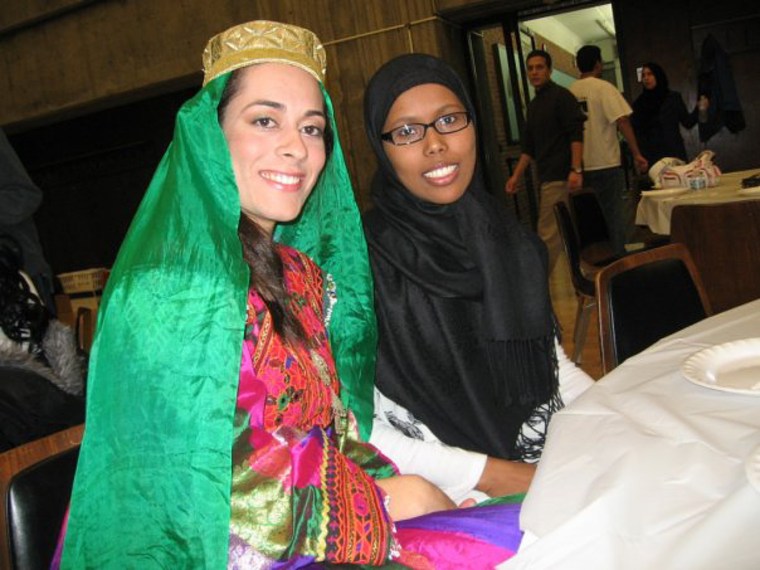Half a world away from the religious conflicts of the Mideast, Muslim, Jewish and Christian students have come together in the name of compassion.
Students of the Muslim Student Association at San Jose State University have long invited students of all faiths to share in their observance of the holy month of Ramadan by fasting from sun-up to sunset. In 2007, they decided to make a more dramatic break with tradition by inviting members of other school organizations to apply their own religious practices to the Ramadan observance.
That invitation led students of the Jewish Student Union, the Campus Catholic Ministries, the Mosaic Multicultural Center and Comparative Religious Studies Program to plan an event that they called “Students Hungry for a Change,” which was focused on fasting.
The event was a success in bringing together students who normally had little interaction, said Billal Asghar, treasurer of the Muslim Student Association.
Suddenly students from religious groups that have long histories of conflict were talking and working side by side for the first time.
Gathering not without controversy
There was some controversy, however.
Some students — primarily those from pro-Israel and pro-Palestinian groups — criticized the gathering. It also stirred controversy when the students invited SJSU Professor Victoria Rue, a feminist Roman Catholic who calls herself a priest, to participate in a discussion panel on love, sex and marriage in various religions. That prompted protests from a local Catholic church and a flood of letters, both pro and con, to the university newspaper, the Spartan Daily,
“I think (organizers) found out that their initial invitation to me was quite a radical thing to do — so a good education all around,” said Rue.
The reaction also indirectly led organizers to common ground: helping those in need, an idea shared by Islam, Christianity and Judaism. Out of this movement was born the Muslim Jewish Christian Coalition of SJSU.
“We came up with a solution,” said Asghar. “Everyone has the right do their own thing, but when we come together, (we said) let’s leave everything at the door. We can talk about politics, but let’s work on helping others, because whatever’s going on (internationally) isn’t our fault. We have no control over that. Over here, we can improve relations by working together.”
Helping those for whom fasting is not a choice
The students decided to focus their efforts on those who fast not by choice, but because they have nothing to eat. They did so by fasting for a day and then joining together to eat and raise money for Heifer International, a nonprofit grass-roots organization that helps end world hunger and poverty through self-reliance and sustainability.
On the appointed day, Dec. 4, students met on campus just before sunset and then broke bread as darkness descended. Some dressed in cultural clothing, and others shared traditional stories and showcased unexpected talents. A few admitted that they had forgotten not to eat throughout the day. When the celebration was over, more than $3,000 had been raised for Heifer International.
Julie Sparks, a SJSU English professor and faculty adviser for Heifer International, said the students appeared to be genuinely interested in sharing their personal beliefs about spiritual matters and their sacred traditions, all in an atmosphere of celebration.
“It felt like home; how things are supposed to be,” said Asghar. “I saw people from different faiths and different backgrounds sitting together with conversations going on. It ended up being a very cool event because it was all improv and people could laugh. We asked if anyone had any talents, and people started acting.”
The students followed up that success with a spring barbecue that raised approximately $500 for victims of strife in Sudan’s Darfur region through the Genocide Intervention Network.
Sharing 'religious perspectives and experiences’
The organization has continued to hold charity events benefiting the needy, but the organizers say it is the members of the diverse group who benefit the most.
“The conversations and dialogue in the organization are rich, respectful, and really provide students with a safer space to share their religious perspectives and experiences,” said Sadika Sulaiman Hara, assistant director of the MOSAIC Cross Cultural Center. “Even more, the understanding students gain about one another allows for misconceptions and stigmas to be broken.”
As a result of their work, the university last year awarded the group its award for “most outstanding cultural/international/social justice organization.”
The students met for the first time recently to begin planning events for the new school year and decided to begin by holding a barbecue to raise money for the homeless in San Jose.
“There is an understanding that (these events) are more than charity; it is a responsibility that each of us must embrace for there to be change,” Sulaiman Hara said. “We each have an individual responsibility to act against injustice, whether that means moving out of our comfort zones to attend, support or assist at events for different faiths or cultures, raising funds for an issue or providing food and clothes for individuals in need.”
